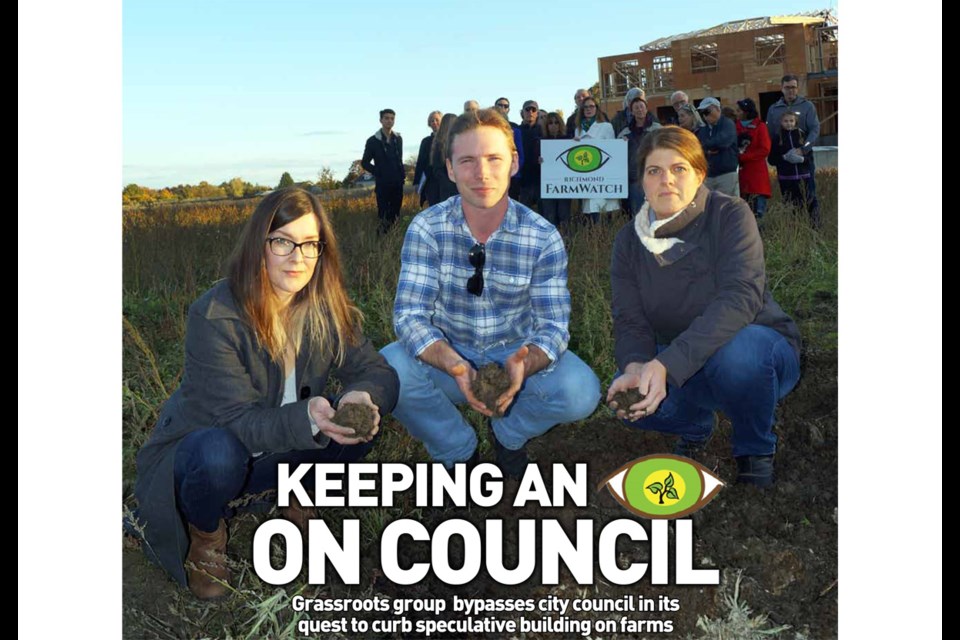A group of activists known for, literally, taking dirt to Richmond City Hall, to have politicians clean up their act, are back behind the tractor.
Richmond FarmWatch is hoping the winds of political change will bring better fortune to their cause — eliminating mega mansions and speculation on the Agricultural Land Reserve (ALR).
Last May, seven city councillors decided to allow for homes twice the size of Ministry of Agriculture guidelines. Although they agreed to review that decision in six months.
Couns. Carol Day and Harold Steves, who are also members of FarmWatch, are expected to table that review for the purposes of debate and a new vote in the coming weeks.
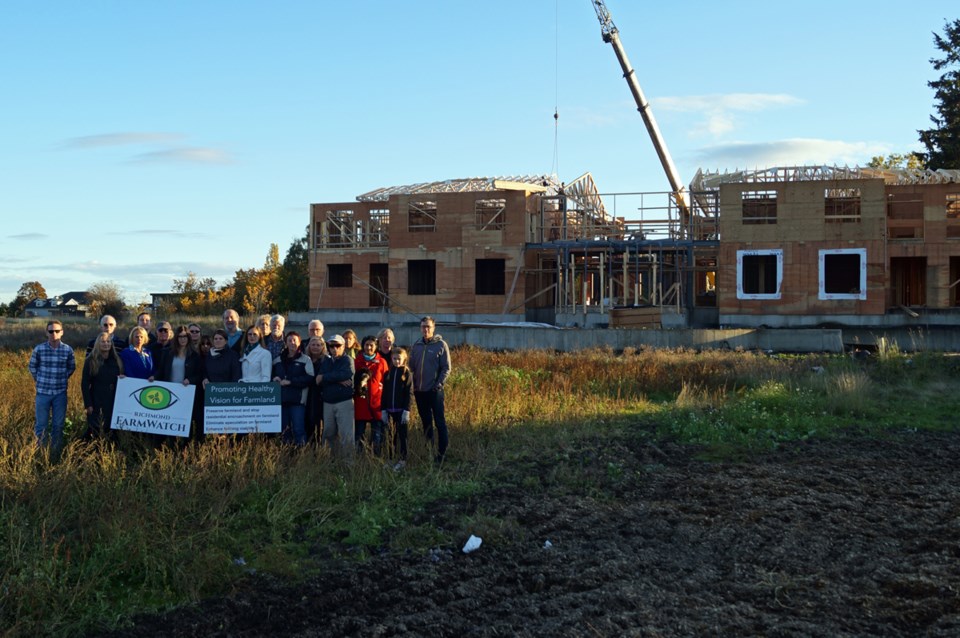
But Laura Gillanders has little faith in council, considering May’s vote and FarmWatch’s last battle — imploring council to beef up its anti-dumping enforcement — has seen mixed results at best.
So, members — who range from small-scale farmers, food security advocates and environmentalists — have gone directly to Minister of Agriculture Lana Popham of the new NDP government.
Popham told the Richmond News she, unlike the past BC Liberal government, will consider legislating house size restrictions on farmland as part of her mandate to revive the ALR.
“A lot of that will be looking at this specific issue; we’re looking at it for sure,” said Popham, who is concerned Richmond farmland is being used as a speculative land bank with mega mansions being used as tools to drive up land value close to $1 million per acre ($50,000 is considered a viable price).
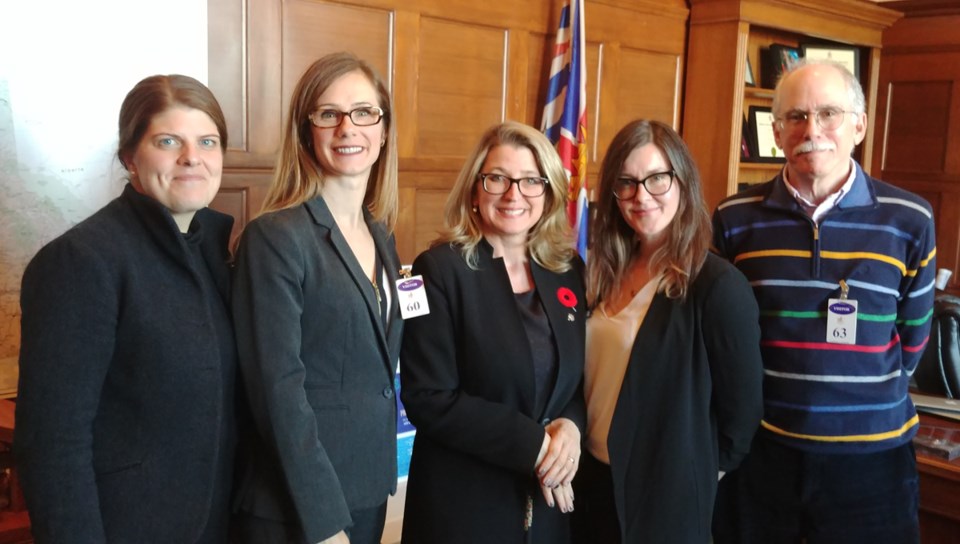
“It’s made sure in some areas, such as Richmond, that we’ve guaranteed new farmers cannot afford to own,” said Popham.
In May, Richmond council reigned in a nearly lawless situation that led to an average house size of 12,583-square-feet on the ALR in 2015. At the request of many ALR landowners and farmers, including the Richmond Farmers Institute, council voted 7-2 to double the ministry standard (and city staff recommendation) of 5,382-square-feet under a new bylaw.
What’s at stake is two-fold, according to FarmWatch member and south Richmond farmer Miles Smart, who owns a five-acre farm growing specialty vegetables.
“A, you’re paving over large chunks of good, usable farmland — some of the best in the world. Take into consideration farmland is being paved over all around the world. The other concern of mine is by enabling people to basically build castles, it raises the value of the land quite astronomically,” explained Smart.
An independent report to council by Site Economics indicated about a 4,200-square-foot maximum would keep land values in balance with farmland use.
Speculation is ruining farmers’ ability to function in Richmond, said Smart, who has “chased away several real estate agents in just the past few months.”
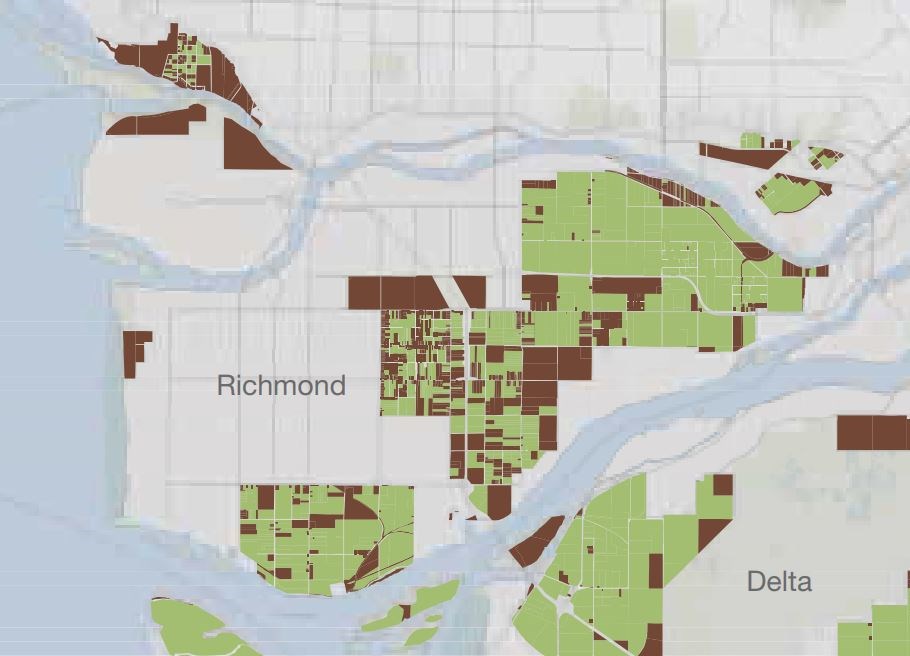
ALR landowners “will make far more money selling their land than selling their crops,” said Smart.
As a result, as a newcomer “it’s next to impossible to farm in this city unless you’re leasing land. And when you’re leasing land the rug can be pulled out at any time. It doesn’t make sense to invest in infrastructure and equipment,” explained Smart.
Adding to the burden, commodity prices have generally not kept up with other expenses.
To that end, all farmers agree other measures need to be taken to ensure farming is once again viable in Richmond.
Smart said east Richmond requires better drainage for vegetable farming. While other farmers have asked for government assistance, Smart is of the belief it ought to be the farmers doing the investment.
But, to date, many ALR owners in Richmond have chosen to plant blueberries, which are relatively cheap to grow and are marginally profitable.
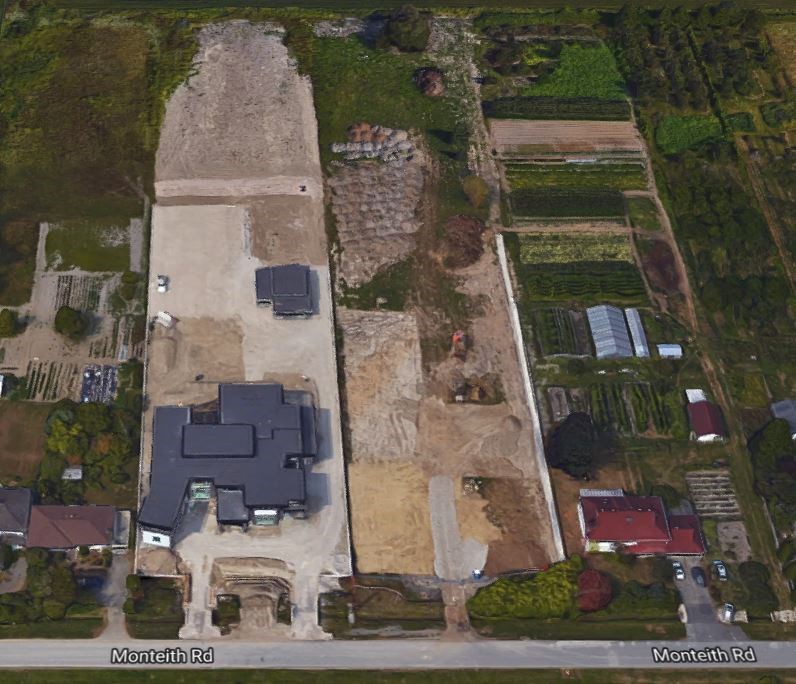
“I see Chinese farmers planting (more profitable) Chinese greens because of improvements they’ve made,” he said.
While blueberry prices falter, they still provide enough income to give ALR landowners property and school tax credits. Metro Vancouver has suggested the amount of income generated from farming be raised in order to qualify for a farm tax incentive. The hopes is that speculators would then be less prone to sit on land.
Popham said she’d review the matter as “we need to make sure the tax incentives ensure production.”
Small farm plots are good start-ups for new farmers, as are incubator farms from land trusts, she added.
But, “the biggest barrier is the cost of land. So we’re starting talk of incentives for leasing,” said Popham.
Another mechanism to rid Richmond of ALR speculation has taken hold — a ban on foreign ownership, proposed by the BC Green Party.
But it has its detractors.
Gillanders said FarmWatch supports it but, “a foreign owner is no more speculative than a local investor."
Foreign owners do lease land to make it farmable but there’s “a sense” of a waiting game “so they can move in and develop it,” she said.
Real estate economist Tom Davidoff, from University of B.C., said it’s more than a feeling.
“Of course people will speculate, because they don’t believe the ALR is forever. There is a ton of land and people need homes here.”
As long as people keep moving here, it will be either single-family home neighbourhoods or farmland, he said.
Richmond-Queensborough MLA Jas Johal told the News foreign ownership can be beneficial, such as in the Interior.
“We want to protect farmland . . . at the same time, private investment is important,” said Johal.
Past BC Liberal Minister of Agriculture Norm Letnick agrees.
He said a provincial ban on foreign ownership could negatively impact productivity, particularly outside the Lower Mainland.
Debate surges over foreign ownership
While other provinces have similar bans, Letnick said B.C. doesn’t need one because it has the ALR. Furthermore, without providing specific data, Letnick said foreign ownership of farms is low in B.C.
But raising the tax incentive threshold is a good start, he noted.
He added that Richmond farmland borders a city and it’s only natural the land will be more valuable.
“If someone wants to farm in areas that have high prices, they may need to look at options such as leases . . . or move north,” said Letnick.
Disagreeing with Letnick is Kent Mullinix, director, Institute for Sustainable Food Systems at Kwantlen Polytechnic University.
“We absolutely need to preclude foreign ownership of all agricultural land,” said Mullinix.
“We also need to eliminate speculative forces, foreign or domestic,” meaning a limit on house sizes, he added.
Mullinix is calling for a full review of the ALR.
“We need to identify the land that is farmable regardless of size and make sure it remains farmable. Then we need to identify lost parcels,” said Mullinix.
Of course, the solutions are not easy and a bigger picture is at work for the local food advocate and critic of neo-liberal economics ad transnational trade in food.
“We want the cheapest food possible, grown around the word regardless of environmental costs, regardless of ethical costs, regardless climate change costs. And in the process we’ve marginalized agriculture, and put most North American farmers in an unfortunate predicament in that the greatest value of their business is their land.
“They don’t make much money producing food, so their money is in their land and ability to cash out. That’s their retirement. This speaks to the need to have a comprehensive examination of what’s going on.”
